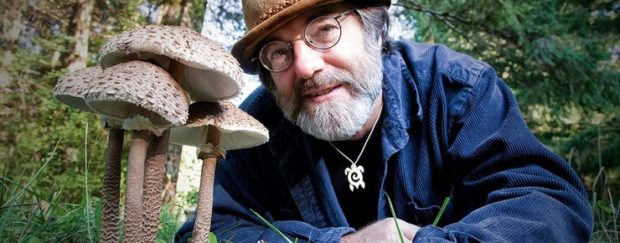 A visually enthralling documentary explores the potential benefits, on a planetary scale, of mushrooms.
A visually enthralling documentary explores the potential benefits, on a planetary scale, of mushrooms.
Mycology has been a relatively neglected subject over the years. It’s the study of mycelium, which is a term for the vegetative part of a fungus, consisting of thread-like filaments that bear fruit in the form of mushrooms. A new movie, written by Mark Monroe, and directed by Louie Schwartzberg, both veterans of documentary filmmaking, aims to remedy that neglect. It’s called Fantastic Fungi (fun-jai), or an alternate pronunciation would be fun-guy—in fact, it’s pronounced that way a couple of times in the film—but the overall consensus, it would seem, is “funjai.” Anyway, maybe this all sounds dull, especially if you’ve endured science films in high school, but it’s not. The film combines a lot of fascinating information with a marvelous visual style.
From the beginning, Fantastic Fungi emphasizes what a massive presence mycelium has on our planet. Underneath the ground, virtually everywhere on earth, exists this vast network of myceliem cells, branching out and breaking down decaying organisms, recycling carbon, regenerating the soil, and fostering new life. So basic and transformative are fungi to our ecosystem that it’s not considered part of the vegetable kingdom, but as something quite apart, and something that has been with us for millions of years. The film’s special visual effects depict the reach of these filaments, that look like root systems, under our feet. It’s explained how they enable the sharing of nutrients between trees and other plants, like an organic underground internet connecting all life forms.
When it comes to mushrooms themselves, Schwartzberg treats us to a lot of mind-blowing time-lapse photography in which we see their slow growth revealed rapidly on the screen. Mushrooms, fungi, and mold have conferred enormous medical benefits—the history of penicillin is briefly covered here—and there is some evidence that they can help eliminate pollutants.
In the course of the film’s tribute to the mushroom, we meet a mycologist named Paul Stamets, who has spent his life walking in forests studying all the mushrooms he can find. Stamets was inspired by the research of Andrew Weil, and he in turn has inspired a host of younger mycologists, some of whom we meet. Stamets is a cheerful and eloquent tour guide for us, although at one point the film almost threatens to become a tribute to him instead of a survey of the science.
Now, besides the amazing biological information about mushrooms that we are presented with, the film goes into the particular subject of the psilocybin mushroom and its psychotropic qualities. There is some speculation that the sudden expansion of the brains of ancient humans may have been partly caused by ingesting these mushrooms. A series of therapists and researchers talk about the proven results of controlled use of the magic mushroom to treat depression, PTSD, and other mental ailments. In addition, Stamets relates how his own elderly mother was cured of breast cancer by taking a variety known as “turkey tail mushrooms.”
I think at times, especially near the end, Fantastic Fungi tries to oversell its message, as if mycelia and mushrooms are the panacea for everything wrong in the world. This overflowing enthusiasm is pretty common in documentaries like this. But having said that, I think one comes away from Fantastic Fungi convinced of the great potential that this life form offers for the benefit of humanity and the planet. It’s one of those rare films about science that inspires not only wonder, but hope.

Emile de Antonio’s 1964 documentary about the Army-McCarthy hearings of ten years earlier, was one of the first directly political documentaries of any scope...

The moral no-man’s land of modern Romania is depicted in Corneliu Porumboiu’s latest picture as an ironic version of film noir. Romanian writer-director Corneliu...

Bernardo Bertolucci’s epic about the life of Pu Yi, China’s last emperor, is a biting depiction of the emptiness of power. The Last Emperor,...